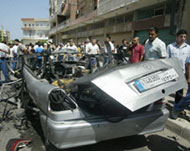Lebanon blast kills Islamic Jihad official
A senior Islamic Jihad official and his brother have been killed in a car bombing in southern Lebanon.

Mahmoud Majzoub, also known as Abu Hamza, was seriously wounded, while his brother, Nidal, was killed instantly in the blast on Friday. Majzoub later died in hospital.
Security sources said the bomb was planted in a parked car and exploded as they approached.
The explosive, which Islamic Jihad said was detonated remotely, reduced the vehicle to a charred mass of twisted metal, showering the area with debris.
Initial reports had suggested the explosion occurred when Majzoub started his car, but security sources said later the bomb had been planted in a stolen vehicle.
The blast, near the Abu Bakr mosque in Sidon, appeared to have been caused by a bomb planted in the vehicle, they said.
Israel blamed
Shortly after the attack, an Islamic Jihad representative in Beirut told Aljazeera that “Mahmoud al-Majzoub was critically wounded”.
 |
|
A bomb was planted in a car |
He was reported dead in the hospital two hours later.
The group has blamed Israel for the attack.
Ali Abu Shahine, an Islamic Jihad official, told Reuters that “this is an Israeli attack and a dangerous escalation”.
“Israel will be held responsible for this attack which crosses red lines by targeting officials outside the Palestinian territories and that changes things,” he added.
An Israeli military source said he was unaware of any involvement by the state in the attack, reports Reuters.
Second attempt
An Islamic Jihad official said it was the second attempt on Majzoub’s life.
|
“Israel will be held responsible for this attack which crosses red lines by targeting officials outside the Palestinian territories and that changes things” Ali Abu Shahine |
The movement has killed more than 30 people in suicide bombings inside Israel since the start of a ceasefire – which has been observed by some other Palestinian resistance groups – including one that left 11 people dead in Tel Aviv on April 17.
Israeli forces have repeatedly attacked Islamic Jihad in the Gaza Strip and the West Bank with missile strikes, and often made arrest raids, prompting calls for revenge from the group.
An official of the Sunni Lebanese group Jamaa Islamiyaa said the blast bore “the hallmarks of Israel“.
“Israel seeks out all symbols of the resistance, and Abu Hamza was known for his militancy,” he said.
Two years ago, Abu Hamza escaped a similar attempt on his life, again in Sidon.
That incident was blamed on a radical Palestinian group.